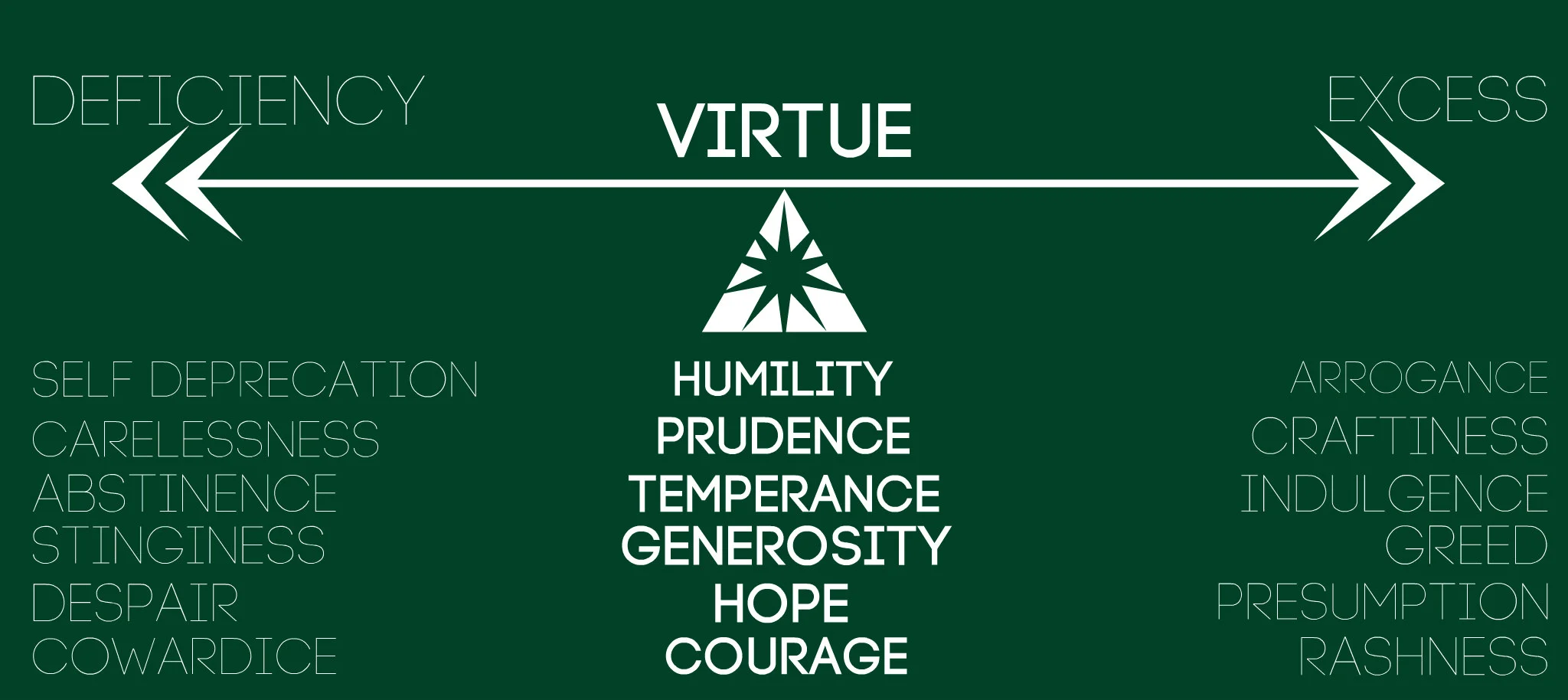Temperance and Secular Culture
How far is too far to participate in secular culture? How far is too far to pull out? Can I let my kids read Harry Potter? Should I go live on a farm in the middle of nowhere to escape secular culture?
I’m not actually going to answer any of those questions specifically. But I do want to talk about one of the virtues we use in answering these questions (and others) for ourselves and our families.
This is an age old conversation, but an important one. First let me quickly define some terms!
Temperance: The ability to moderate your actions. Most Bible translations refers to this as “self-control” in the lists of the fruit of the Spirit.
Virtue ethics: Focuses on the virtue or moral character—the heart, dispositions, and habits—of a person rather than on external actions and duty (deontology). We can see this in scripture in many places, most notably in the Sermon on the Mount.
Aristotle’s Golden Mean: Virtue is the mean between two extremes—the opposing ends being vices of excess and deficiency. This principle can be seen many times in the Bible when it talks about not turning aside. Such as Deut. 5:32, “Be careful to do as the Lord your God has commanded you; you are not to turn aside to the right or the left.”
There are two common dispositions towards American culture that I see in the church at the moment (and for all time really, but I’m going to speak only into modern, western society). One is unrestricted (or nearly) indulgence in secular culture which can lead to further sin and idolatry. This is the “excess” side of the golden mean scale. The other is total (or nearly) abstinence from secular culture which often leads to legalism and self-righteousness. This is the “deficient” side of the golden mean scale. Both are vices, not virtues.
Now, I know what some of you are thinking at this point. Most orthodox Christians attempt to find a balance between participation in and abstinence from culture. We don’t always draw the line in exactly the same place. I would agree with that. It’s even a good thing that we don’t all make the exact same choices with our cultural diet because some disagreement, as long as it is civil, builds up the body of Christ.
So then, why say those vices (a lack of temperance) are common? Although it is generally known that we should find balance with our participation in secular culture, there’s real confusion about how to express such temperance. Confusion comes from our evaluation of our subculture and the human tendency to overcorrect when we see a problem. More on overcorrecting subculture in Part Two.
Christians are not taught how to think critically. Most evangelical seminaries do not even offer classes in the basics of philosophy (i.e. critical thinking, logic, metaethics, etc.) whereas Catholic and Orthodox seminaries require them. (Rabbit trail: Why is that important? I could go on and on about that, but I’ll keep it simple. Lest you think “human philosophy” is all evil, recall that logic is a kind of science that says if A and B contradict each other, they can’t both be true. Seeing as God does not contradict himself, it’s safe to conclude that God is logical, and we should strive to be as well. We should not believe contradictions.)
Our church congregants as well as our church leaders typically have no training in how to think critically. And how can we rightly discern the balance of such things as cultural involvement without those skills? We usually don’t. We overcorrect into vice which leads some to cultural indulgence and idolatry and others to cultural abstinence and legalism. Then we sit back and judge those who overcorrect in the other direction. Without temperance, we will not only fall, often unknowingly, into vice, but we will have a complete lack of grace for others who simply fall differently.
Let me give you an example of these two things.
Indulgence (excess vice): The community of Christians who write and read science fiction and fantasy, like myself, varies widely. There are those who make great effort to think critically about how far they should go with their writing and reading and how closely it should resemble that of the secular market. Then there are others who, upon seeing the problems with abstaining from much of pop culture, delve headlong into the fantasy world without restraint. Some of their fiction includes sex and the use of explicitly dark magic by protagonists. They see themselves as critical thinkers because they dodge the bullet of “legalism.” Yet, in their new found freedom from fundamentalism, they display an utter lack of critical thinking against indulgence, seeing it as good or the lesser of two evils. Cultural indulgence in general is prone to either deleting parts of scripture or twisting the meaning to fit certain needs. By some of these well intentioned readers and authors, I have been accused of being a fundamentalist due to articles like this one that tell of my position on sexual purity. (Not to be confused with the purity movement which uses shame to keep young people from premarital sex.)
Abstinence (deficient vice): In some circles I run in, lifestyles such as homeschooling, stay-at-home moms, and even patriarchy are commonplace. For the right family and the right child, homeschooling is prudent. And not only am I a stay-at-home mom, but I think it’s a blessing for any mom to be able to stay with their child when they’re an infant and toddler. Yet, where the indulgent delete or twist scripture, the culturally abstinent tend to stretch the commands of the Bible like silly putty so that they are no longer recognizable. For example, Proverbs 22:6 says, “Train up a child in the way he should go.” This becomes the basis by which they advise others that public school is inadvisable or even immoral. Worse is the petrifying fear within the American conservative community of radical feminism. The overcorrection against such liberalism can be drastic and horribly unbiblical. Was the baby not thrown out with the bathwater by Paige Patterson, former president of a Southern Baptist seminary, when he advised a female student who had been sexually assaulted not to go to the police? In this conservative subculture, I have been labeled by some as erring in indulgence due to my stance on women’s roles within the church because I affirm their need to use their God-given spiritual gifts in accordance with scripture. Their role should not be defined by Bible-belt culture. Ironically, this view is shared by at least some professors at the theologically orthodox Southern Seminary.
I point out how I have been labeled by these subcultures not to merely complain or to show that I must be in the right because I think I fall in the middle of the two and, therefore, must have the virtue of temperance. But, instead, I want to illustrate that they can’t both be right. We can’t all be right, especially when we believe such contradictory things. I said before that disagreement, as long as it is civil, builds up the church. We must have temperance paired with grace if we are to flourish in unity. Knowing that it is in our nature to overcorrect into vice, grace is required for others who do the same in a different direction.
Pray that God grants his people temperance, wisdom, and understanding in this area. Ask also that we would learn to be more gracious to our brothers and sisters who are different from us.


